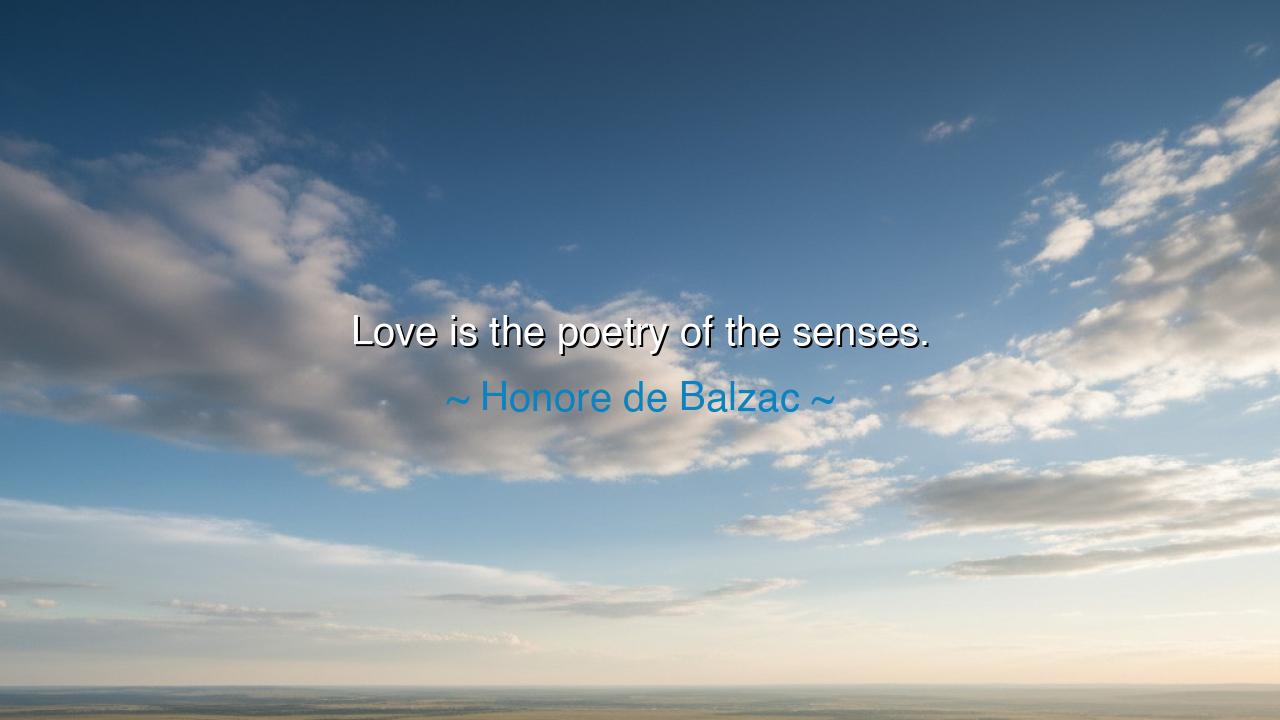
Love is the poetry of the senses.






"Love is the poetry of the senses." These words, spoken by Honoré de Balzac, speak to the very core of what love truly is—a sensory experience, an art that paints the world with colors unseen, sounds unheard, and feelings unfelt. Love is not merely an emotion confined to the heart or mind; it is an experience that permeates the body and soul. Love is the fragrance of a lover's embrace, the taste of a kiss, the sound of a voice that calls to you in the night, the touch of hands that speak more than words ever could. Love is a poetry that dances in the spaces between each sense, turning ordinary moments into extraordinary experiences.
Consider the timeless story of Cleo and Antony, whose love was felt through every sense. When Cleopatra first met Mark Antony, the air itself seemed to change—every word they spoke, every glance exchanged was filled with the poetry of the senses. The richness of her perfume, the softness of her voice, the warmth of her touch—they were all part of a larger, more profound language that could not be captured by mere words. It was a love that was felt not just in the heart, but in every part of the body, as though their senses had come alive in ways they had never experienced before. Love, like poetry, gives us the ability to see the world anew, to experience the beauty of life through a richer, more visceral lens.
In the life of Abelard and Heloise, their love was much like Balzac's poetry—a love that transcended mere intellect and moved them through their bodies. While their connection was founded on shared intelligence and respect for one another’s minds, it was also rooted deeply in their senses. When Heloise writes to Abelard, her words are infused with longing, desire, and the intense physicality of her love. Their love was not just an exchange of ideas, but an intimate experience that stirred every sense—every kiss, every letter, and every moment they spent together was infused with the poetry of the senses. They lived not only in their thoughts but in the feeling of each other’s presence, the very sound of each other's names becoming poetry to their hearts.
Love is like the wind that blows through the trees, unseen but deeply felt. It is an energy that fills the senses, turning the mundane into the extraordinary. In the story of Pablo Neruda and his poetry, we find another illustration of how love and poetry intertwine with the senses. Neruda’s verses are not merely written words—they are experiences. The touch of his pen on paper carries the taste of love, the smell of passion, and the sound of longing. His poetry evokes a visceral reaction because his words tap into the senses, calling the reader not just to think, but to feel deeply. Neruda’s love was an embodiment of this truth, for he wrote not just with his mind, but with his heart, his hands, and his very senses.
The lesson in Balzac's quote is clear: love is not something confined to the heart or mind; it is an experience that touches every part of our being. Just as poetry weaves together words to create something that resonates deeply with the soul, love brings together the senses to create a deeper connection with the world and with one another. To truly love is to open oneself to every sensation, to embrace the beauty that can only be perceived through the heart and the senses, not just intellect.
In your own life, I urge you to allow yourself to feel love with all of your senses. Do not allow love to be merely a fleeting thought or an abstract emotion, but let it seep into the very core of your being. When you love, let it be seen in the way you look at someone, in the way you listen to their voice, in the way you feel their touch. Allow your love to become the poetry of your senses, a language that transcends words and speaks directly to the soul. Engage fully with the world around you, for when you love deeply, everything becomes imbued with the essence of poetry.
Love is not something to be experienced passively—it is to be felt, tasted, seen, and heard. It is to live fully in the moments of connection, of touch, of sensation. And in this, you will find that your life, like a well-wrought poem, becomes richer, more profound, and more vibrant. Love is the poetry that turns the ordinary into the extraordinary, that brings the fullness of life to all who embrace it. Live fully, love deeply, and let the poetry of the senses guide you in every step.






AAdministratorAdministrator
Welcome, honored guests. Please leave a comment, we will respond soon